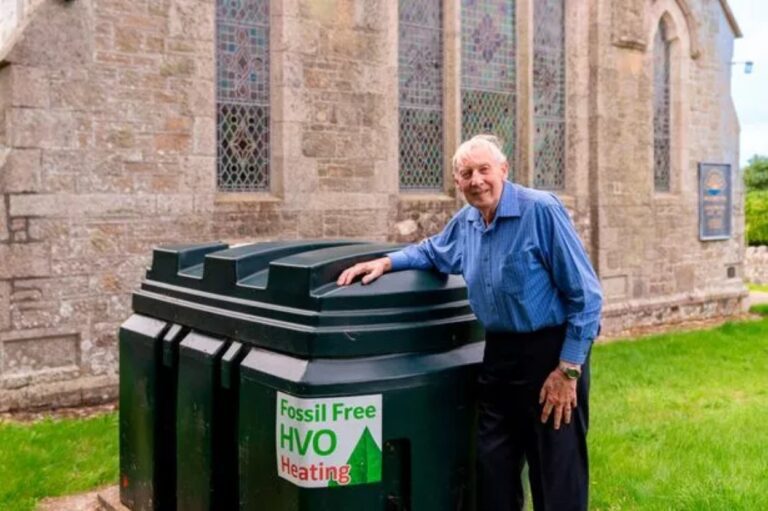
Kehelland is a tiny Cornish hamlet featuring a small primary school and a Methodist church that acts as a village hall and community hub.
Faced with the growing need to decarbonise, fuel distributor Mitchell & Webber has helped the Cornish village to transition from fossil fuel to renewable energy, demonstrating how straightforward and successful the switch can be.
Like many rural communities across the south west, it is off the gas grid, and villagers have traditionally relied on fossil heating boilers to keep warm.
The UK government’s proposed solution – heat pump installation – incurs considerable upfront cost in these rural properties, as well as high ongoing costs due to current electricity prices.
Taking an alternative approach to solving the rural decarbonisation challenge, Mitchell & Webber has helped save more than 423 tonnes of carbon emissions in Kehelland, since 2020, by introducing HVO (hydrotreated vegetable oil) for heating homes – a clear demonstration of what can be achieved immediately.
Now, five years on from the project launch, local residents have shared how they have benefited from the switch.
Suitable alternatives
David Biggs, a resident of 41 years, believes that the government seems blinkered about heat pumps where homes and businesses are off gas grid, and will not push ahead with alternative renewable fuel options for boilers when they could make a difference.
David lives in an older house that can’t be retrofitted with a heat pump system as easily as brand-new ones.
“I can’t afford that,” said David. “I would have to lift all the tiles and redo the roof with new insulation. That would cost about £13,000. We have a concrete floor which is difficult to insulate, so we’d have to rip it up and put new pipes in and new insulation. That’d cost about £40,000.
“But even if I could afford to do all this and had heat pumps put in, there’s no guarantee it’d keep the place warm. The government also suggests a high-temperature heat pump that may utilise the existing radiators, but these heat pumps often use more electricity, and when the grid capacity is the key barrier to installation in rural areas, this all becomes tricky.
“When I walk the dog around the village, I always get into conversations about how much of a positive impact HVO has made with local villagers. They are still bemused as to why this hasn’t been implemented in similar rural communities.”
Transforming lives
Mitchell & Webber Director John Weedon said: “We wanted to look at a village scenario with a school, a church, and at least 25 homes to have a feel of scale. Kehelland is also a village with different types of properties, from Georgian houses with solid granite walls right up to modern bungalows.
“It’s been a great success. We have demonstrated that HVO reduces 90% of CO2 emissions compared with kerosene heating oil, and works in all types of houses and all types of boilers.
“For many people with homes that aren’t suitable for heat pumps, and who can’t afford to spend thousands of pounds, it’s about offering a greener alternative and greater choice.’’
A greener path
Many rural churches and chapels are often not connected to the main for heating, gas, electricity, and sewage.
Andrew Geake, an environment and climate change advocate with the Methodist Church for the South West Peninsula District, oversaw Kehelland Church’s switch to HVO following a previous trial at Stithians.
As churches and chapels are old and often listed buildings and are only used sporadically, Andrew doesn’t believe heat pumps would be feasible or efficient, as you need to keep heat pumps running for a long time to work.
“The Methodist Church recently set out its aspirations to become net zero by 2030,” Andrew said.
“I’m not a hair-shirt environmentalist. It’s about being a pragmatic environmentalist, and without this HVO solution, there may be a disastrous impact on our progress as a carbon-neutral church that could throw us back decades.”
Expanding options
For John and fellow director Robert Weedon, switching villages to HVO is about showing the government that green policies can’t be one-size-fits-all and encouraging them to accept that there are other alternatives.
Currently, kerosene attracts an effective duty of zero for use in heating and 5% VAT for domestic use, whereas HVO attracts a duty of 10p per litre with a 20% VAT rate.
With the renewable solution currently subject to much higher duties than the fossil fuel it replaces, Mitchell & Webber, in line with the campaign from national trade associations UKIFDA and OFTEC, is hoping its Kehelland trial will convince the Government of the need to bring HVO to the same level playing field as kerosene.
“We are asking for this new renewable fuel to have the same duty rate as heating oil, and for the energy department to start the renewable fuel obligation, detailed in the Energy Act 2023, straight away, so all off-grid constituents can benefit,” John explained.
“It won’t cost the government anything to do it; that’s the beauty of it. We’re not anti heat pumps – anything that helps to decarbonise the economy is great – we just think consumers should have more choice and be able to choose what’s the best solution for their property.”
Robert added: “Encouragingly, the Irish government has taken a major step toward heat decarbonisation by approving the Renewable Heat Obligation Bill 2025 and using HVO for home heating. This is a landmark climate policy aimed at decarbonising the heating sector in Ireland.
“The scheme will soon mandate fossil heating fuel suppliers to integrate renewable sources such as HVO, due to be implemented in homes by early 2026.’’
Urging the UK to follow suit, John concludes: “The fact we have been running the village pilot for nearly five years, is a clear indicator this works. The UK government must now follow Ireland and introduce this fuel to help rural homeowners.”
Images provided by Mitchell & Webber